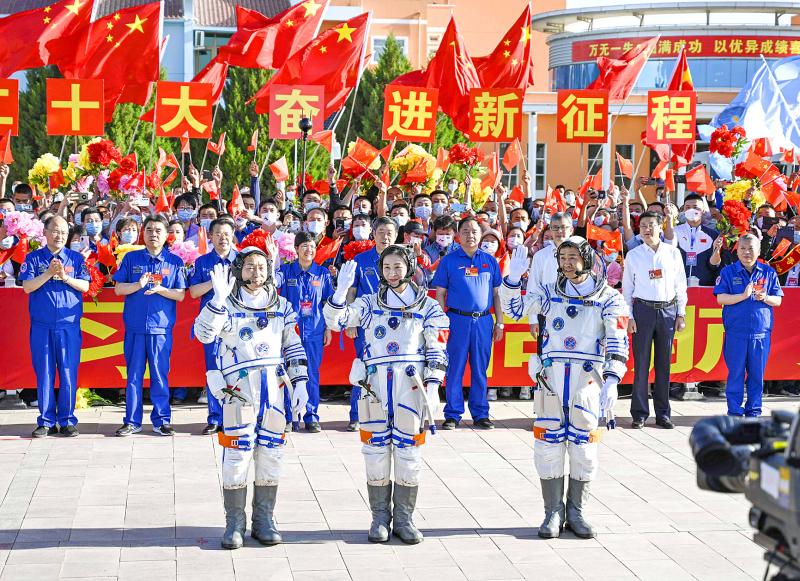China yesterday launched a rocket carrying three astronauts on a mission to complete construction on its new space station, the latest milestone in Beijing’s drive to become a major space power.
The trio blasted off in a Long March-2F rocket from the Jiuquan launch center in northwestern China’s Gobi desert, with the team to spend six months expanding the Tiangong space station, state broadcaster China Central Television said.
Tiangong, which means “heavenly palace,” is expected to become fully operational by the end of this year. China’s heavily promoted space program has already seen the nation land a rover on Mars and send probes to the moon.

Photo: AFP
The Shenzhou-14 crew is tasked with “completing in-orbit assembly and construction of the space station,” as well as “commissioning of equipment” and conducting scientific experiments, state-run China Global Television Network said on Saturday.
Led by air force pilot Chen Dong (陳冬), the three-person crew’s main challenge is to connect the station’s two lab modules to the main body.
Dong, along with fellow pilots Liu Yang (劉洋) and Cai Xuzhe (蔡旭哲), are to become the second crew to spend six months aboard the Tiangong after the last returned to Earth in April following 183 days on the space station.
Tiangong’s core module entered orbit earlier last year and is expected to operate for at least a decade.
The station shares a similar design with the Soviet Mir station that orbited Earth from the 1980s until 2001.
The world’s second-largest economy has poured billions into its military-run space program, with hopes of having a permanently crewed space station this year and eventually sending humans to the moon.
The country has made large strides in catching up with the US and Russia, whose astronauts and cosmonauts have decades of experience in space exploration.
Under Chinese President Xi Jinping (習近平), the country’s plans for its heavily promoted “space dream” have been put into overdrive.
In addition to a space station, Beijing is also planning to build a base on the moon, and the Chinese National Space Administration said it aims to launch a crewed lunar mission by 2029.
China has been excluded from the International Space Station (ISS) since 2011, when the US banned NASA from engaging with the country.
While China does not plan to use its space station for global cooperation on the scale of the ISS, Beijing has said it is open to foreign collaboration.
The ISS is due for retirement after 2024, although NASA has said it could remain functional until 2030.

MONEY GRAB: People were rushing to collect bills scattered on the ground after the plane transporting money crashed, which an official said hindered rescue efforts A cargo plane carrying money on Friday crashed near Bolivia’s capital, damaging about a dozen vehicles on highway, scattering bills on the ground and leaving at least 15 people dead and others injured, an official said. Bolivian Minister of Defense Marcelo Salinas said the Hercules C-130 plane was transporting newly printed Bolivian currency when it “landed and veered off the runway” at an airport in El Alto, a city adjacent to La Paz, before ending up in a nearby field. Firefighters managed to put out the flames that engulfed the aircraft. Fire chief Pavel Tovar said at least 15 people died, but

LIKE FATHER, LIKE DAUGHTER: By showing Ju-ae’s ability to handle a weapon, the photos ‘suggest she is indeed receiving training as a successor,’ an academic said North Korea on Saturday released a rare image of leader Kim Jong-un’s teenage daughter firing a rifle at a shooting range, adding to speculation that she is being groomed as his successor. Kim’s daughter, Ju-ae, has long been seen as the next in line to rule the secretive, nuclear-armed state, and took part in a string of recent high-profile outings, including last week’s military parade marking the closing stages of North Korea’s key party congress. Pyongyang’s official Korean Central News Agency (KCNA) released a photo of Ju-ae shooting a rifle at an outdoor shooting range, peering through a rifle scope

South Korea would soon no longer be one of the few countries where Google Maps does not work properly, after its security-conscious government reversed a two-decade stance to approve the export of high-precision map data to overseas servers. The approval was made “on the condition that strict security requirements are met,” the South Korean Ministry of Land, Infrastructure and Transport said. Those conditions include blurring military and other sensitive security-related facilities, as well as restricting longitude and latitude coordinates for South Korean territory on products such as Google Maps and Google Earth, it said. The decision is expected to hurt Naver and Kakao

Gaza is rapidly running out of its limited fuel supply and stocks of food staples might become tight, officials said, after Israel blocked the entry of fuel and goods into the war-shattered territory, citing fighting with Iran. The Israeli military closed all Gaza border crossings on Saturday after announcing airstrikes on Iran carried out jointly with the US. Israeli authorities late on Monday night said that they would reopen the Kerem Shalom crossing from Israel to Gaza yesterday, for “gradual entry of humanitarian aid” into the strip, without saying how much. Israeli authorities previously said the crossings could not be operated safely during